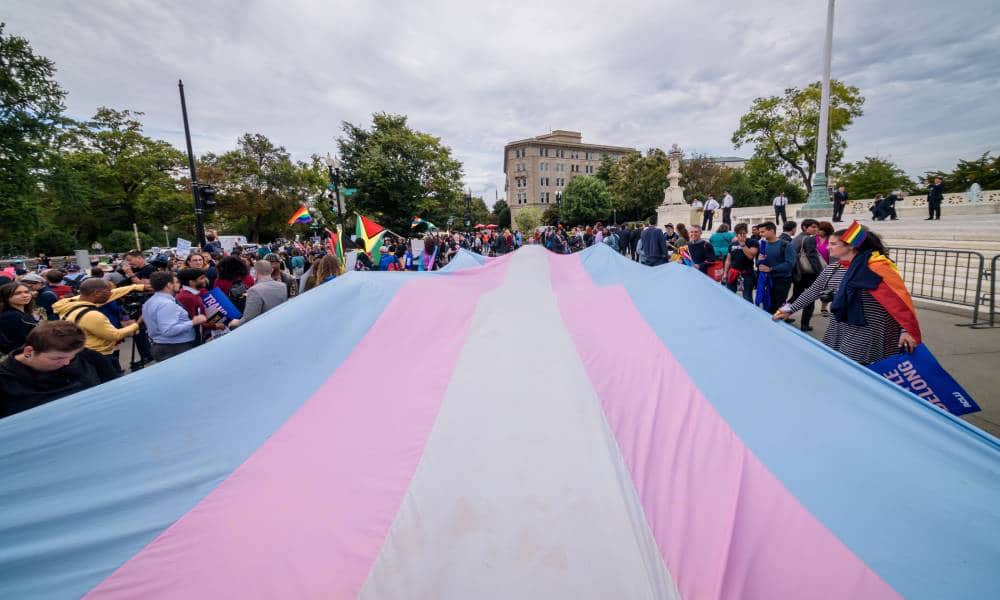A giant trans flag unfurled outside the US Supreme Court. (Photo by Erik McGregor/LightRocket via Getty Images)
West Virginia must pause enforcement of a new law that prohibits trans women and girls from participating in sports after a trans youth challenged the vile law.
The West Virginia ban was “proudly” signed into law by Republican governor Jim Justice in April amidst a swell of anti-trans legislation passing through the US.
Becky Pepper-Jackson, an 11-year-old trans athlete, along with the ACLU, sued the West Virginia State Board of Education in June, seeking an injunction to stop the anti-trans law from taking effect.
The lawsuit argued Becky, who “comes from a family of runners”, would be “denied” the opportunity to participate on her school’s girls’ cross-country and track teams “because she is transgender”. Therefore, it claimed the sports ban discriminates against the runner on the “basis of sex” and her “transgender status”.
District judge Joseph R Goodwin has granted Becky a temporary victory over the anti-trans law, issuing an injunction Wednesday (21 July). Goodwin said in his ruling that he had been “provided with scant evidence” that the anti-trans law “addresses any problem at all”, “let alone an important one”.
He added that Becky will be “permitted to sign up for and participate in school athletics in the same way as her girl classmates”.

“I am excited to know that I will be able to try out for the girls’ cross-country team and follow in the running shoes of my family,” Becky said in a statement.
She continued: “It hurt that the state of West Virginia would try to block me from pursuing my dreams. I just want to play.”
Josh Block, senior staff attorney with the ACLU LGBTQ and HIV Project, added that he hoped the ruling “sends a message” to other states to “stop demonising trans kids to score political points”. Instead, Block argued politicians should “let these kids live their lives in peace”.
Lambda Legal, the ACLU of West Virginia and Cooley LLP, also worked tirelessly alongside the ACLU and Becky’s family to bring forward the lawsuit.
Federal judge temporarily blocks an Arkansas law banning gender-affirming treatments for trans youth
Arkansas became the first state to ban all gender-affirming treatments and surgery for trans youth in April. The bill was originally vetoed by governor Asa Hutchinson, but the state legislature opted to override Hutchinson’s veto just 24 hours later.
The ACLU filed a lawsuit against the “devastating” anti-trans law in May. The LGBT+ advocacy group said the legislation would force many trans youth and their families to “leave the state to access the gender-affirming care they need”.
District judge Jay Moody ruled in favour of the ACLU’s lawsuit and said that pulling gender-affirming care “midstream” would “cause irreparable harm” to trans minors and patients. The temporary injunction will allow healthcare professions to provide hormone treatments, puberty blockers or gender-affirming surgeries to trans minors.
According to the Associated Press, the vile law was set to take effect on 28 July.
Holly Dickson, executive director of the ACLU of Arkansas, called the ruling a “victory” and a “testament to the trans youth of Arkansas and their allies, who never gave up the fight” to stop the anti-trans legislation.
“We won’t rest until this cruel and unconstitutional law is struck down for good,” she added.
However, Arkansas attorney general Leslie Rutledge said she plans to appeal the decision. CNN reported that she claimed in a statement that the ACLU is using “our children as pawns for their own social agenda”. She also vowed to “aggressively defend” the law.
But the governor has spoken out against the anti-trans law once again. Hutchinson said in a statement that the act is “too extreme” and does “not provide any relief for those young people currently undergoing hormone treatment with the consent of their parents and under the care of a physician”.
“If the act would have been more limited, such as prohibiting sex reassignment surgery for those under 18, then I suspect the outcome would have been different,” the governor said.
